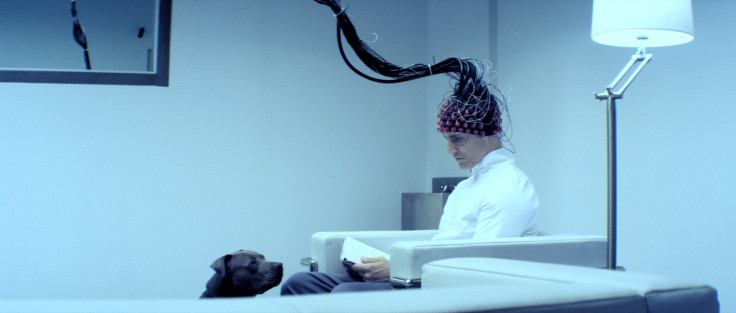If the technology existed to incept a mind it wouldn’t take Leonardo DiCaprio and a full team of specialists for long. No, if inception were a thing you could be sure that the military would have it down to a gun before long. And then all it would take is one government--perhaps one with a fetish for worldwide “collect it all” surveillance--with the paranoia-suffused gumption to enslave us all. Pushing the idea of mass mind control further than any movie since The Matrix, the indie science fiction thriller Listening, the directorial debut of Khalil Sullins, may not have the budget to fold cities in front of our eyes, but succeeds as a chilling look into a future where the walls between minds are forcefully knocked down and our very souls are put under surveillance.
Listening looks a lot like Primer and other recent low-budget science fiction movies. Its aesthetic is resolutely lo-fi, with the inside of a garage as its main set. But while Listening is stylistically in line with the current trends in indie sci-fi, it feels like a very different movie.
Primer, Sound of My Voice, I Origins, Coherence, and Upstream Color are all movies that are resolutely indie in not just aesthetic, but also mentality. Many are intentionally obscure, dense, and ambiguous, designed for an audience over-familiar with the parameters of standard genre plotting and in search of something that shakes convention.
Instead, Listening feels like a cleverly shrunk down blockbuster, with big ideas to deliver with the narrative shape of a mainstream thriller. This is a poor comparison, since they’re really not at all alike, but for some reason I kept thinking of Joel Schumacher’s Flatliners while watching Listening.
This is both Listening’s great strength, as it tears through big ideas with roller coaster glee, but also its main weakness, as viewers are roped into character drama that can feel very conventional.
Listening begins with David (Thomas Stroppel) and Ryan (Artie Ahr) teaming up with nanotube expert Jordan (Amber Marie Bollinger) to build a mind reading interface. Meanwhile, a secret CIA project is trying to unlock the secret to controlling human brains. It’s not much of a spoiler to say that soon their work has gone from a garage project to a global conspiracy nightmare, as the CIA co-opts their research and their lives for sinister ends.
As Listening rushes toward its endgame it expands considerably, jumping from the perils of knowing the innermost thoughts of those closest to you to a splashy cornucopia of government conspiracy paranoia. ELF weapons, psychic surveillance, evil vaccination programs, and other staples of conspiracist thought become thriller fuel.
But getting to Listening’s more fun material can be a bit of a slog, with the middle third overly occupied with familial stuff that’s too perfunctory to feel consequential, but too central to breeze by. Stuff like Ryan’s extreme poverty and David’s troubled family life adds welcome depth to the tech-bro leads, but will mostly make you miss the garage and its zippy technobabble. Too much of what’s going on relies on information imbalances for artificial and unnecessary drama. For no good reason David keeps his work from his wife, leading to pointless conflicts and unnecessary jealousies. It's hard to sympathize with David's wife Melanie (Christina Haeberman) when both David and the viewers know that she's simply flat-out incorrect about David's infidelities. And while that's part of the point--that even people empowered with telepathy can be estranged from each other--it ends up hampering more than it enriches.
Still, while Listening isn’t the best at handling its character drama, enough science fiction hijinks land that Listening becomes the rare indie sci-fi thriller with some genuine excitement to it. As Listening starts piling on fun genre stuff, like the Beyond the Black Rainbow-esque Red Room, it builds up a nice head of steam.


















